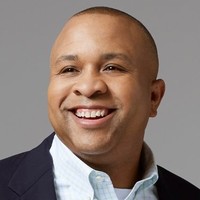Grady Burrows is an engineer and an IT guy, and is the executive director of HIT in the CLE, an organization that works with high school and college students to provide greater access to computer and data science programs. Grady embraces the idea that with hard work comes great reward, but knows he couldn’t have gotten to where he is today without a great support network.
“Do not for one second think that you’re less than, that you’re incapable of, or that you cannot achieve whatever it is that you want to do.”
When you were 12 or 13-years old, what interests did you have? What decision-making led you to where you are today?
I always liked math and science, and I enjoyed technology. I just liked the way that technology was making things better. Technological innovations were taking place in the world around me, and I knew that I wanted to have a hand in that somewhere and somehow. And as I got a little older in high school, I started thinking about engineering as a discipline to study in college. And somebody said, well, of all the engineering disciplines, industrial and systems engineering is the discipline that really best melds and meshes technology and people together. And I’m a people person, I enjoy working with people. I said, wow, if I can study anything, I think industrial engineering will be the discipline for me.
Can you talk about the obstacles you had to overcome in entering the engineering profession?
College in general, it wasn’t easy. Definitely, it was a challenge. But I did have the ability to participate in a pre-engineering program at Ohio State for minority students. It was a seven week program called Profess, and it allowed me to go to school with about 15 other students coming in, and our cohort was one that locked arms together. We found our way through college together, and we really stood side by side. We helped each other out, and without it I don’t think I would have made it.
How important is it for students to seek out those support systems?
It’s huge because there are a lot of people and a lot of support systems out there to help you, but you can’t live on an island by yourself. You have to reach out and raise your hand and say, I need help, or I would like to network and find other people who look like me, who think like me and who might be able to understand my perspective or where I’m coming from. Many of us have walked those same roads and bridges, and crossed some of those same obstacles that you might cross. So believe me when I say that by reaching out and talking to other people who are a little older and who have gone through this before, you can gain some really good insight and wisdom and help in navigating some of the challenges you might face as you pursue a STEM career.


Comments are closed.